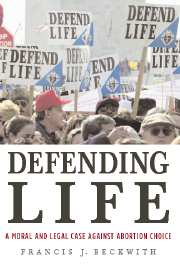Book contents
- Frontmatter
- Contents
- Acknowledgments
- Introduction
- PART I MORAL REASONING, LAW, AND POLITICS
- PART II ASSESSING THE CASE FOR ABORTION CHOICE AND AGAINST HUMAN INCLUSIVENESS
- PART III EXTENDING AND CONCLUDING THE ARGUMENT
- 8 Cloning, Bioethics, and Reproductive Liberty
- 9 Conclusion: A Case for Human Inclusiveness
- Notes
- Selected Bibliography
- Index
8 - Cloning, Bioethics, and Reproductive Liberty
from PART III - EXTENDING AND CONCLUDING THE ARGUMENT
Published online by Cambridge University Press: 05 June 2012
- Frontmatter
- Contents
- Acknowledgments
- Introduction
- PART I MORAL REASONING, LAW, AND POLITICS
- PART II ASSESSING THE CASE FOR ABORTION CHOICE AND AGAINST HUMAN INCLUSIVENESS
- PART III EXTENDING AND CONCLUDING THE ARGUMENT
- 8 Cloning, Bioethics, and Reproductive Liberty
- 9 Conclusion: A Case for Human Inclusiveness
- Notes
- Selected Bibliography
- Index
Summary
Although abortion is the issue that first brought many citizens into the bioethics arena, today bioethics is dominated by other issues that are perceived as more pressing. Nevertheless, the answer to the philosophical question lurking behind abortion – Who and what are we? – turns out to be the key that unlocks the ethical quandaries posed by these other issues. After all, if human persons ought not to be subjects of research or killed without justification, and if the unborn from conception is a full-fledged member of the human community, abortion as well as other procedures, such as certain forms of cloning and embryo manipulation, are prima facie morally wrong.
Some bioethicists seek to sidestep the question of the unborn's full humanity by suggesting a neutral posture toward it. They maintain that bioethical decisions can be made apart from answering this question. Take, for example, the 1994 recommendations of the National Institutes of Health Embryo Research Panel, a body consisting of bioethicists across many disciplines including philosophy, theology, law, and medicine. Formed in 1993, this panel was commissioned to make recommendations about what types of research on the embryo prior to implantation and outside the woman's uterus (ex utero) are appropriate or inappropriate for federal funding. The main ethical concern for the panel was the moral permissibility of creating human embryos for the sole purpose of experimenting on them.
- Type
- Chapter
- Information
- Defending LifeA Moral and Legal Case against Abortion Choice, pp. 203 - 225Publisher: Cambridge University PressPrint publication year: 2007



